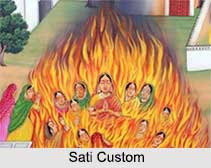 Sati was the custom among some Hindu communities in which a newly widowed woman either willingly or by force or oppression commits suicide as an effect of her husband"s death. In this custom, if a woman lost her husband she would also put an end to her existence by ascending the funeral pyre. This custom is popularly known as "Saha-gamanam" or "going with her lord". The custom of Sati has long been connected with India.
Sati was the custom among some Hindu communities in which a newly widowed woman either willingly or by force or oppression commits suicide as an effect of her husband"s death. In this custom, if a woman lost her husband she would also put an end to her existence by ascending the funeral pyre. This custom is popularly known as "Saha-gamanam" or "going with her lord". The custom of Sati has long been connected with India.
Origin of Sati
The term "sati" is derived from the original name of the goddess Sati, who self-immolated as she was not capable to bear her father Daksha`s dishonour of her husband Lord Shiva. Sati first appears in the historical record in the supremacy of the Gupta Empire, 320 to 550 CE. During the Gupta period, incidents of sati began to be recorded in Madhya Pradesh from 510 CE. The tradition spread to Rajasthan, where it has happened most frequently over the centuries.
Different explanations are offered for the origin of this seemingly peculiar and inhuman custom. One of them can be mentioned as that the foreign invaders like the Muhammadans carried away the widows and subjected them to unheard of cruelty. During those unsettled days, life without a husband was considered to be worse than death. Hence probably the widows in certain cases voluntarily became the Sati to escape from the inevitable dishonour at the hands of the beastly foreign invaders. In other cases she was forced to become as sati by her relations as well.
Abolition of Sati
 Under the rule of the Mughal emperors, sati was banned more than once. Akbar the Great first banned the practice around the year 1500; later on Aurangzeb tried to end it again in 1663, after a trip to Kashmir where he witnessed it. During the European colonial period, Britain, France and the Portuguese all tried to stamp out the practice of sati. The British East India Company imposed a ban on sati in the city of Kolkata only in 1798. Lord William Bentinck assisted by Raja Ram Mohan Roy desired to put an end to this evil custom in Bengal. He was surely influenced by a feeling of pity for the poor miserable widows.
Under the rule of the Mughal emperors, sati was banned more than once. Akbar the Great first banned the practice around the year 1500; later on Aurangzeb tried to end it again in 1663, after a trip to Kashmir where he witnessed it. During the European colonial period, Britain, France and the Portuguese all tried to stamp out the practice of sati. The British East India Company imposed a ban on sati in the city of Kolkata only in 1798. Lord William Bentinck assisted by Raja Ram Mohan Roy desired to put an end to this evil custom in Bengal. He was surely influenced by a feeling of pity for the poor miserable widows.
The matter of sati became a rallying point for British Christians, who pushed legislation throughout the House of Commons in 1813 to allow missionary work in India specially to end practices like "sati". By 1850, British majestic attitudes against sati had hardened. Officials like Sir Charles Napier threatened to hang for any Hindu priest who supported over a widow-burning. British officials put deep pressure on the rulers of the princely states to ban sati, as well. As a result of being outlawed, sati began to decline in the 19th century. In the late 1950`s, a majestic sati took place. Performed in Jodhpur by Sugankunverba, the widow of Brigadier Jabbar Singh Sisodia, her act of self-immolation occurred unlawfully and allegedly in secret. The Maharani Padmavati Gaekwad of Baroda, her close friend, provided this explanation of her death in 1984.
Prevention Act of Sati
At present, India"s Prevention Act of Sati (1987) makes it banned to force or support anyone to carry out sati. Forcing someone to commit sati can be punished to death. However, a small number of widows still choose to join their husbands in death.



















